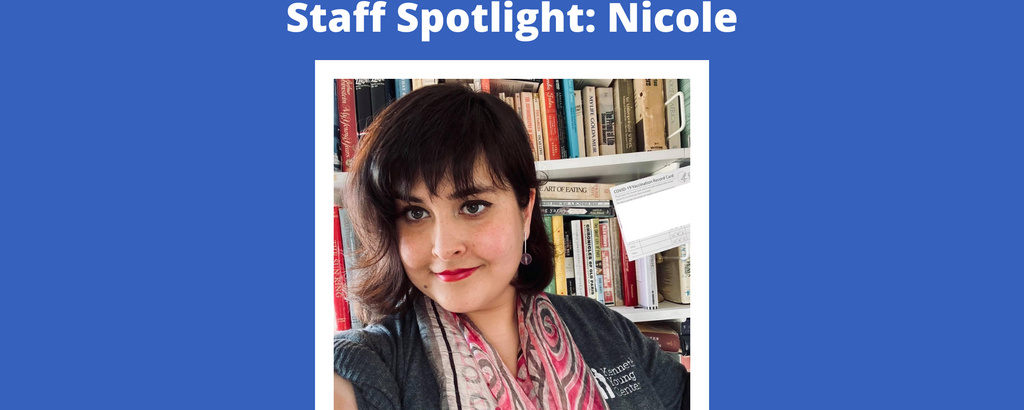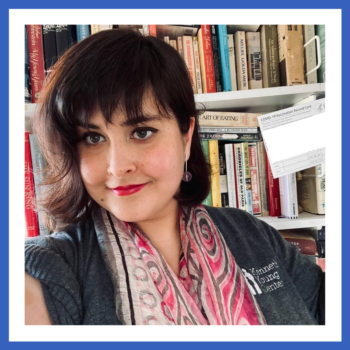
Staff Spotlight: Meet Nicole, Occupational Therapist
KYC is honored to highlight the work that our team members do within and beyond our agency – team members like Nicole truly exemplify our vision that Together We Thrive. By sharing her passion for her work through the American Occupational Therapy Association’s (AOTA) Mental Health Special Interest Section Standing Committee, she is helping to bring other talented students and young professionals to the mental health field and helping clients connect with the vital resources they need to achieve their goals.
Building Connections, Building Careers

Nicole Barker, OTR/L, is an Occupational Therapist with KYC’s Community Living team. “I’m one of two front-line treatment Occupational Therapists. I help figure out what people need to lead fulfilling, meaningful lives with the supports they need for independence,” Nicole explains.
Nicole’s passion for helping clients achieve their goals is clear – as she talks about her work, her energy and commitment to her clients, her team, and her profession are undeniable and inspiring. This is undoubtedly why she was selected to serve a three-year term on the American Occupational Therapy Association (AOTA) Mental Health Special Interest Section Standing Committee as both the New Professionals Coordinator and the Communications Coordinator.
The Committee seeks to promote the development and growth of the role of Occupational Therapy (OT) in mental health – something that Nicole is keenly passionate about. She shares dual roles on the Committee, which she shares with another OT professional. Nicole has a special focus on promoting mental health care as part of OT treatment, and in promoting opportunities for Occupational Therapists who are newly-graduated or early in their careers. “I want to convert as many OT students into being interested in mental health as possible, as well as bring further attention to our historical role of mental health providers,” she shares. She also helps disseminate the latest evaluation methods and growth opportunities among other Occupational Therapists across the country – knowledge that she can bring right back to her own work with clients at KYC.
Occupational Therapy as a Mental Health Profession

AOTA states that Occupational Therapy (OT) is a branch of health care that helps people across the lifespan participate in the things they want and need to do through the therapeutic use of everyday activities (occupations). “It has some overlap with nursing and a lot in common with social work. I deeply appreciate the opportunity to work with both as part of my team,” Nicole shares.
Nicole explains that at its roots, OT was grounded in mental health work around the end of World War I, as soldiers were returning home, and were dealing with what was then termed “shell shock,” in addition to physical impairments. Occupational Therapists helped soldiers reintegrate to daily life by guiding them to adapt to their everyday living environments. The field later became more focused on helping people adapt to medical and physical ailments, but in recent years, the field has returned more focus to mental health.
As an Occupational Therapist, Nicole completes evaluations to address clients’ complex needs, helping them build daily routines and strengthen skills of daily living. That could include helping people with “getting dressed in the morning, taking medications at the right time, learning how to clean your apartment, up to complex things like collaborating on environmental modifications to their apartments, such as determining if equipment like wheelchairs or other devices are needed.” Nicole shares that “the Colbert & Williams Decrees in particular were groundbreaking, because we’re going back to [the Class Members’] natural environments – going in to someone’s home can let you do exactly what you need to do for them, rather than simulating in a hospital environment.”
Helping Clients Live As Independently As Possible: Colbert & Williams Consent Decrees

Kenneth Young Center is honored to highlight Nicole and the work of our Occupational Therapists and Community Living team as part of our 50th anniversary celebrations. Through our #KYC50For50 campaign, we're highlighting 50 stories, events, and updates as we honor 50 years of service to our communities.
“I work with our clients who are members of the Colbert & Williams Consent Decree classes, moving them out of nursing home placements into as independent of a living setting as is possible for them,” Nicole shares.
As Nicole summarizes, the Colbert and Williams Consent Decrees are an outgrowth of lawsuits related to the Medicaid Olmstead Decision at the Supreme Court that said that people with disabilities (physical and mental, including mental health) have a right to live in the community first, before being institutionalized. (You can find more information about the Decrees on the Illinois Department of Human Services website here.)
Each Class Member needs personalized support and resources to live safely in the community based upon their physical, emotional, and mental health needs. “Sometimes it’s as simple as teaching them how to use grab bars in their showers, or as complex as crafting a new daily routine now that they are no longer institutionalized,” shares Nicole.
A Holistic Approach to Mental Health
With the addition of Occupational Therapists to our team at KYC, we’re able to provide personalized wrap-around services to the people we serve. “At KYC, we’re continuing to promote the [OT] profession, and the need for this role as we fill in the gaps of clients’ needs,” shares Nicole, who has been with KYC for a year and a half. “Our department has hired more Occupational Therapists as Clinical Care Managers, a different way to apply our profession’s skillset effectively. People at KYC really do have an active commitment to a team approach – it’s boots on the ground and collaborative work – and have a goal in mind that we’re talking together to work things out for clients. I give a huge shout-out to my teammate and fellow OT, Alyssa Daleiden OTR/L, QMHP, and the rest of the Community Living Team!”
Through our unique depth and breadth of services, KYC strives to connect community members with all of the resources they need to live their best lives.
Celebrating Nicole

KYC is proud to celebrate all that Nicole has done to support the people she serves, her team, and the OT professional community. Congratulations on your acceptance to the AOTA Mental Health Committee, and for all you do to help others thrive!
Careers at KYC
Kenneth Young Center offers a variety of career opportunities for talented professionals looking to make an impact in our communities. Check out our open positions if you’re looking to grow your career.
Previous Article Next Article

